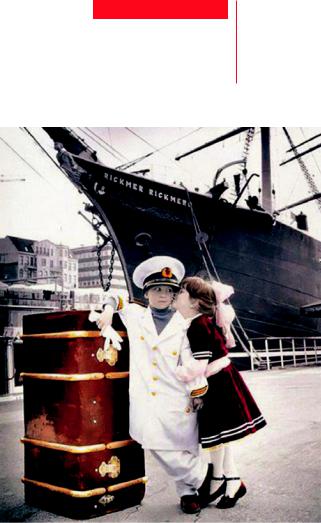
- •NEWS IN BRIEF
- •TEXTS FOR READING
- •Juvenile Delinquency
- •Numbats and Wandoo Trees
- •METHODS OF TEACHING
- •CLASSROOM ACTIVITIES
- •Good Friends Help You Live Longer
- •CREATIVE WRITING
- •Friendship
- •FOCUS ON LANGUAGE
- •Strange Friends
- •TEACHERS FORUM
- •LESSON PLANS
- •TOPICAL JOURNEY
- •Friendship Day
- •Importance of Friendship in Bible
- •Friendship Stories
- •Symbols of Friendship
- •Friendship Literature
- •Shakespeare Quotations on Friendship
- •Letter Writing
- •Idioms about friendship
- •Email Etiquette
- •FOCUS ON LITERATURE
- •SCHOOL THEATRE
- •Six Friends
- •Five-Minute Tests
- •YOUTH ENGLISH SECTION
- •Compliments

A FRIEND OF MINE OR
Cultural Differences
This is a long-standing Russian tradition of English teachers to give pupils the task to describe ‘your friend’. Pupils are supposed to say what their friend looks like and what he/she is like, what interests they share and what activities they enjoy doing together. Many teachers remember the days when pupils were to comment on the proverb ‘A friend in need is a friend indeed’ and it is was heard more than once that ‘a true friend should help me in everything’. With more and more contacts with native speakers, both Russian teachers and learners found out that the English word ‘friend’ did not exactly coincide in meanings with the Russian ‘друг’, and the explanations led to revelations about different cultural approaches.
There have been different types of research done in our country and abroad that stress the intimacy that we, Russians, share in our relationships. Dating back to Soviet times, it was not easy for Russians to form relationships, in fear of betrayal leading to political persecution. People in Russian communities had very few friends, but the friends they did have were extremely close. They valued greatly their personal relationship. Many Russians continue with these types of relationships today; we have friends that we will tell everything to and who we trust and have the utmost respect for.
In many countries in the world, the word ‘friend’ is tossed around very loosely: a friend is anyone from someone you have a deep, personal relationship with, to a person you see occasionally and may not know much about. However, in Russia there is a different name for those types of relationships and the word ‘friend’ is only used for a person that you have a deep, intimate relationship with. Many people in Russian communities can come off as cold and distant at first meeting, but once some trust is gained with a person, the community will open up and show the person the warmth and love of friendship. As a British student once noticed, ‘Russians are hostile to strangers and warm to friends.’A woman from France made her own observation in the late 70s: ‘Russians are so wonderful! They are absolutely unselfish. If a person sees something nice in a shop – a book or a handbag, or anything, they will buy two of them – one for themselves, the other one for a friend.’ –Those Russians who remember the days of severe shortages will easily understand such motives. When an Oxford student also expressed her admiration of Russian kindness, she was asked a sarcastic question: “But haven’t you read Gulag Archipelago where you could find plenty of examples of so-called ‘kindness’?” She waived the argument aside: “But I am not talking about political matters!”
There are other cultural qualities that go back to Soviet times. Times were tough, and many people had to create relationships with people in certain businesses in order to get the things they needed. If you needed to get your child into a hospital, it would be best to know someone in medicine, or working in the hospital. Everyone worked to help one another and make personal connections.
TEACHERS FORUM English
MY FRIEND? 15
February 2013
In the Unites States, friendship is a more loosely based term. From the time children enter elementary school, most teachers and adults call every other peer they have a ‘friend’ and in most classrooms, or any social setting, children are told how to behave with their friends, and are told who their friends are. This type of open approach to friendship has led many Americans to have taken on the term ‘best friend’, or ‘special friend’. Many people in the United States have come to define their friends in a particular way, and research proves this has been happening for nearly 30 years. While many other cultures value deep trust and meaning to their friendships, Americans will use the word ‘friend’ to describe any person who you see frequently. Many studies have also found that Americans, as time goes on, and life becomes busier, will often lose touch with friends. Americans also use the term ‘friend’ very freely, referring to someone they have known for a few weeks as a friend, perhaps for lack of a term for someone who is more than an acquaintance but less than a special friend. The rise of social networking websites, like My Space and Facebook, also diluted the traditional meaning of the world ‘friend’, due to the manner of many users to accept requests from people whom they have ‘met’only once – or not at all – and, once the request is accepted, include that person in their ‘friend list’.
In many ways, these new meanings will be true for Russians today. As life in Russia is also becoming busier and social networking websites are also becoming a bigger part of our life, the emotional meaning of the words ‘my friend’ is giving way to a more sober meaning of ‘a friend of mine’. More’s the pity.
By Olga Sventsitskaya
